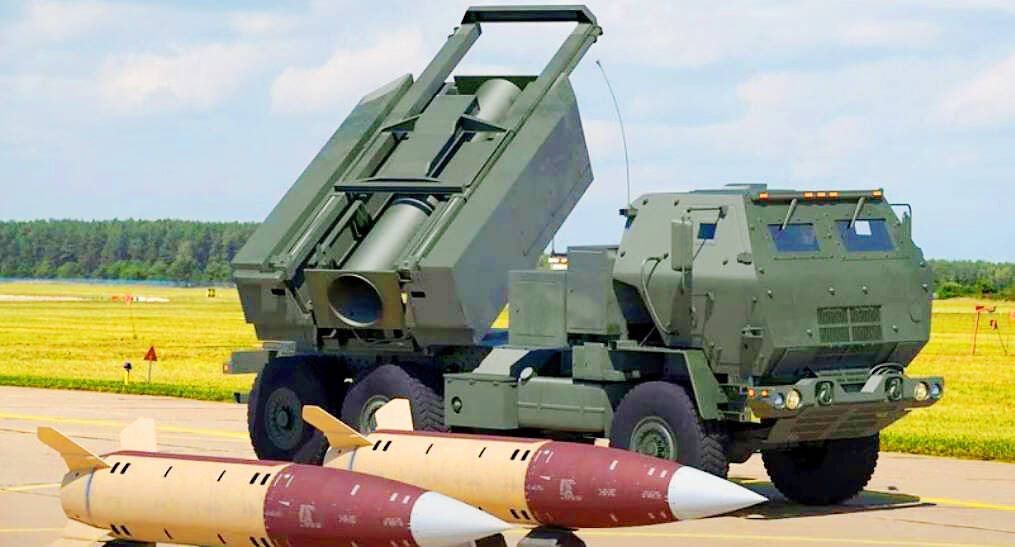The US’ early delivery of long-range tactical ballistic missiles to Taiwan last month carries political and strategic significance, a military source said yesterday.
According to the Ministry of National Defense’s budget report, the batch of military hardware from the US, including 11 sets of M142 High Mobility Artillery Rocket Systems (HIMARS) and 64 MGM-140 Army Tactical Missile Systems, had been scheduled to be delivered to Taiwan between the end of this year and the beginning of next year.
However, the first batch arrived last month, earlier than scheduled, with the second batch —18 sets of HIMARS, 20 MGM-140 missiles and 864 M30 and M31 Guided Multiple Launch Rocket System (GMLRS) rockets — expected to be delivered by 2026.

Photo: Frame grab from Global Defense Corp’s YouTube channel
M30 and M31 GMLRS rockets have an average range of 70km and a maximum range of 94km, while their integrated GPS-aided navigation systems allow them to accurately hit enemy targets.
MGM-140 missiles have a much longer range of up to 300km.
The early delivery of the MGM-140 missiles before the GMLRS rockets indicated a strategic decision to send an international message, said a source from the ministry, who asked to remain anonymous.
Previously, the US would defer the delivery of long-range, high-precision weapons to Taiwan out of concern for cross-strait tensions, even though those arms sales had been approved, the source said.
For example, the delivery of advanced, medium-range, air-to-air missiles — which are compatible with F-16 Fighting Falcon combat aircraft — was not completed and remained on hold in Guam until Taiwan developed indigenous medium-range air-to-air missiles of the same level — the advanced Tien Chien II (Sky Sword II) missiles, the source said.
The early delivery of long-range MGM-140 missiles reflected the US’ strategy to counter Chinese coercion by helping Taiwan to bolster its capacity to strike targets within China’s national borders, they said.
The MGM-140 missiles could be launched across the Taiwan Strait to attack critical airports and military bases in China if Beijing initiates a military assault against Taiwan, the source said.
Since the Third Taiwan Strait Crisis in 1995 and 1996, Taiwan has developed indigenous ballistic missiles with ranges long enough to reach China’s coastal and inland military bases, although their number and accuracy have yet to be released to the public, the source said.
The indigenous Hsiung Feng IIE (HF-IIE, “Brave Woid 11E”) and extended-range HF-IIE cruise missiles have yet to be disclosed either, the source added.

Taiwan is stepping up plans to create self-sufficient supply chains for combat drones and increase foreign orders from the US to counter China’s numerical superiority, a defense official said on Saturday. Commenting on condition of anonymity, the official said the nation’s armed forces are in agreement with US Admiral Samuel Paparo’s assessment that Taiwan’s military must be prepared to turn the nation’s waters into a “hellscape” for the Chinese People’s Liberation Army (PLA). Paparo, the commander of the US Indo-Pacific Command, reiterated the concept during a Congressional hearing in Washington on Wednesday. He first coined the term in a security conference last

Prosecutors today declined to say who was questioned regarding alleged forgery on petitions to recall Democratic Progressive Party (DPP) legislators, after Chinese-language media earlier reported that members of the Chinese Nationalist Party (KMT) Youth League were brought in for questioning. The Ministry of Justice Investigation Bureau confirmed that two people had been questioned, but did not disclose any further information about the ongoing investigation. KMT Youth League members Lee Hsiao-liang (李孝亮) and Liu Szu-yin (劉思吟) — who are leading the effort to recall DPP caucus chief executive Rosalia Wu (吳思瑤) and Legislator Wu Pei-yi (吳沛憶) — both posted on Facebook saying: “I

The Ministry of Economic Affairs has fined Taobao NT$1.2 million (US$36,912) for advertisements that exceed its approved business scope, requiring the Chinese e-commerce platform to make corrections in the first half of this year or its license may be revoked. Lawmakers have called for stricter enforcement of Chinese e-commerce platforms and measures to prevent China from laundering its goods through Taiwan in response to US President Donald Trump’s heavy tariffs on China. The Legislative Yuan’s Finance Committee met today to discuss policies to prevent China from dumping goods in Taiwan, inviting government agencies to report. Democratic Progressive Party Legislator Kuo Kuo-wen (郭國文) said

The Ministry of Economic Affairs has fined Taobao NT$1.2 million (US$36,900) for advertisements that exceeded its approved business scope and ordered the Chinese e-commerce platform to make corrections in the first half of this year or its license would be revoked. Lawmakers have called for stricter supervision of Chinese e-commerce platforms and more stringent measures to prevent China from laundering its goods through Taiwan as US President Donald Trump’s administration cracks down on origin laundering. The legislature’s Finance Committee yesterday met to discuss policies to prevent China from dumping goods in Taiwan, inviting government agencies to report on the matter. Democratic Progressive Party